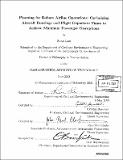| dc.contributor.advisor | Cynthia Barnhart and John-Paul Clarke. | en_US |
| dc.contributor.author | Lan, Shan | en_US |
| dc.contributor.other | Massachusetts Institute of Technology. Dept. of Civil and Environmental Engineering. | en_US |
| dc.date.accessioned | 2005-06-02T16:13:02Z | |
| dc.date.available | 2005-06-02T16:13:02Z | |
| dc.date.copyright | 2003 | en_US |
| dc.date.issued | 2003 | en_US |
| dc.identifier.uri | http://hdl.handle.net/1721.1/17568 | |
| dc.description | Thesis (Ph. D.)--Massachusetts Institute of Technology, Dept. of Civil and Environmental Engineering, 2003. | en_US |
| dc.description | Includes bibliographical references (leaves 115-123). | en_US |
| dc.description.abstract | Airlines typically construct schedule plans based on the assumption that every flight leg departs and arrives as planned. Because this optimistic scenario rarely occurs, these plans are frequently disrupted and airlines often incur significant costs in addition to the originally planned costs. Flight delays and schedule disruptions also cause passenger delays and disruptions, and disrupted passengers experience very long delays and contribute to a significant amount of the total passenger delay. A more robust plan can alleviate flight and passenger delays and disruptions and their effects in the operation, and eventually reduce the operation costs. In this dissertation, we first define various robustness criteria in the context of airline schedule planning. Then we present two new approaches for robust airline schedule planning to achieve minimum passenger disruptions: Robust Aircraft Maintenance Routing, and Flight Schedule Retiming. Because each airplane usually flies a sequence of flights, delay of one flight might propagate along the aircraft route to downstream flights and cause further delays and disruptions. We propose a new approach to reduce delay propagations by intelligently routing aircraft. We formulate this problem as a mixed integer programming problem with stochastically generated inputs. An algorithmic solution approach is presented. Computational results obtained by using data from a major U.S. airline show that this approach could reduce delay propagations significantly, thus improving on-time performance and reducing passenger disruptions. Passengers miss their connections if there is not enough time for them to connect. These passengers experience very long delays. We develop a new approach to minimize the number of passenger misconnections by re-timing the departure times of flights. | en_US |
| dc.description.abstract | (cont.) Within a small time window. We generate copies for each flight arc in the flight network and let the model pick the set of flight copies that minimizes the number of disrupted passengers. We show various ways to formulate the problem and study the properties of these models. An algorithmic solution approach is presented. Computational results obtained by using data from a major U.S. airline show that this approach could significantly reduce the number of passenger misconnections. | en_US |
| dc.description.statementofresponsibility | by Shan Lan. | en_US |
| dc.format.extent | 123 leaves | en_US |
| dc.format.extent | 4530108 bytes | |
| dc.format.extent | 4529917 bytes | |
| dc.format.mimetype | application/pdf | |
| dc.format.mimetype | application/pdf | |
| dc.language.iso | eng | en_US |
| dc.publisher | Massachusetts Institute of Technology | en_US |
| dc.rights | M.I.T. theses are protected by copyright. They may be viewed from this source for any purpose, but reproduction or distribution in any format is prohibited without written permission. See provided URL for inquiries about permission. | en_US |
| dc.rights.uri | http://dspace.mit.edu/handle/1721.1/7582 | |
| dc.subject | Civil and Environmental Engineering. | en_US |
| dc.title | Planning for robust airline operations : Optimizing aircraft routings and flight departure times to achieve minimum passenger disruptions | en_US |
| dc.type | Thesis | en_US |
| dc.description.degree | Ph.D. | en_US |
| dc.contributor.department | Massachusetts Institute of Technology. Department of Civil and Environmental Engineering | |
| dc.identifier.oclc | 52769892 | en_US |
